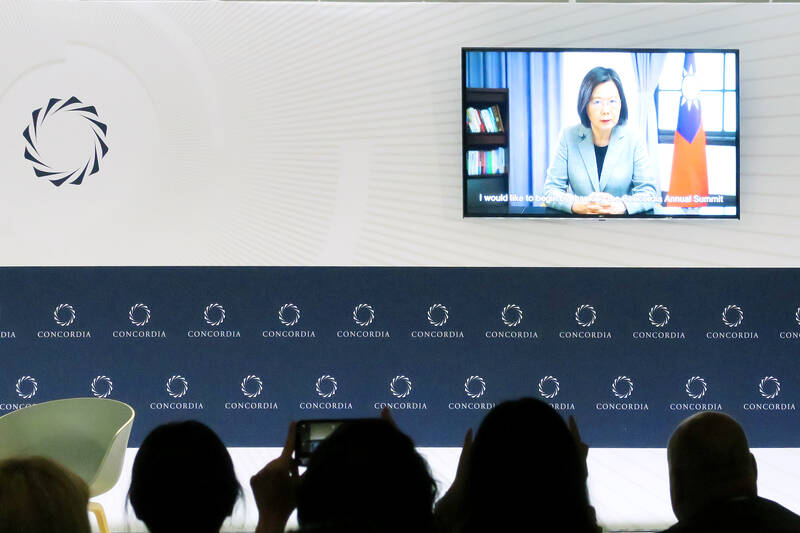Securing Taiwan’s democracy is imperative to ensuring freedom and human rights, President Tsai Ing-wen (蔡英文) told the Concordia Summit in a prerecorded video on Monday.
Tsai was asked by the nonprofit organization Concordia to address the summit, which takes place on the sidelines of the annual UN General Assembly in New York City.
Tsai said the summit is taking place at a consequential time, as democracies and the rules-based international order are being challenged by the COVID-19 pandemic, and attempts by authoritarian regimes to corrode democratic institutions and tarnish human rights and civic space.

Photo: CNA
“At this moment, democracies and the rules-based world order are facing the greatest challenges since the Cold War,” she said.
Tsai touted Taiwan’s role in donating masks and medical equipment to other countries at the beginning of the pandemic, while also sharing information about the virus, despite not being a member of the UN.
“With the inclusion of Taiwan in the UN system, I am confident that we can work even more closely to face future challenges and safeguard the rules-based international order,” she said.
Securing Taiwan’s democracy is imperative in securing freedom and human rights for the world’s collective future, Tsai said, adding that Taiwan should bolster its partnerships with international bodies such as the G7 and ASEAN, as well as maintain strong relations with its diplomatic allies.
“By working together, we are resisting what authoritarian regimes do best — divide and conquer — and foiling their expansionist goals,” she said.
“By standing united in our shared values and beliefs, I am confident that we can achieve what we set out to accomplish,” she added.
Separately yesterday, Tsai attended the opening of an annual cybersecurity show in Taipei to tout her government’s efforts to build a comprehensive information security defense system.
The theme of Cybersec 2022 — “Digital Transformation, Cybersecurity Upgrades” — matches the government’s direction in developing digital policies, Tsai told the event at the Taipei Nangang Exhibition Center.
The Ministry of Digital Affairs was established last month, while the National Institute of Cyber Security is to begin operations at the end of this year, Tsai said.
The government is accelerating its efforts to build a comprehensive joint system for cybersecurity protection, she added.
To that end, the Financial Supervisory Commission has revised regulations to encourage listed companies in Taiwan to establish a dedicated cybersecurity unit and appoint a chief cybersecurity officer, she said.
By the end of this year, 113 listed companies are expected have such a unit in place, she added.
Meanwhile, 80 high-tech firms have joined the Taiwan Cyber Security Alliance, a group that facilitates the exchange of cybersecurity information, she said.
Taiwan has also established SEMI E187, a specification for fab equipment, to boost semiconductor information security, she added.

AIR SUPPORT: The Ministry of National Defense thanked the US for the delivery, adding that it was an indicator of the White House’s commitment to the Taiwan Relations Act Deputy Minister of National Defense Po Horng-huei (柏鴻輝) and Representative to the US Alexander Yui on Friday attended a delivery ceremony for the first of Taiwan’s long-awaited 66 F-16C/D Block 70 jets at a Lockheed Martin Corp factory in Greenville, South Carolina. “We are so proud to be the global home of the F-16 and to support Taiwan’s air defense capabilities,” US Representative William Timmons wrote on X, alongside a photograph of Taiwanese and US officials at the event. The F-16C/D Block 70 jets Taiwan ordered have the same capabilities as aircraft that had been upgraded to F-16Vs. The batch of Lockheed Martin

US President Donald Trump yesterday announced sweeping "reciprocal tariffs" on US trading partners, including a 32 percent tax on goods from Taiwan that is set to take effect on Wednesday. At a Rose Garden event, Trump declared a 10 percent baseline tax on imports from all countries, with the White House saying it would take effect on Saturday. Countries with larger trade surpluses with the US would face higher duties beginning on Wednesday, including Taiwan (32 percent), China (34 percent), Japan (24 percent), South Korea (25 percent), Vietnam (46 percent) and Thailand (36 percent). Canada and Mexico, the two largest US trading

GRIDLOCK: The National Fire Agency’s Special Search and Rescue team is on standby to travel to the countries to help out with the rescue effort A powerful earthquake rocked Myanmar and neighboring Thailand yesterday, killing at least three people in Bangkok and burying dozens when a high-rise building under construction collapsed. Footage shared on social media from Myanmar’s second-largest city showed widespread destruction, raising fears that many were trapped under the rubble or killed. The magnitude 7.7 earthquake, with an epicenter near Mandalay in Myanmar, struck at midday and was followed by a strong magnitude 6.4 aftershock. The extent of death, injury and destruction — especially in Myanmar, which is embroiled in a civil war and where information is tightly controlled at the best of times —

China's military today said it began joint army, navy and rocket force exercises around Taiwan to "serve as a stern warning and powerful deterrent against Taiwanese independence," calling President William Lai (賴清德) a "parasite." The exercises come after Lai called Beijing a "foreign hostile force" last month. More than 10 Chinese military ships approached close to Taiwan's 24 nautical mile (44.4km) contiguous zone this morning and Taiwan sent its own warships to respond, two senior Taiwanese officials said. Taiwan has not yet detected any live fire by the Chinese military so far, one of the officials said. The drills took place after US Secretary